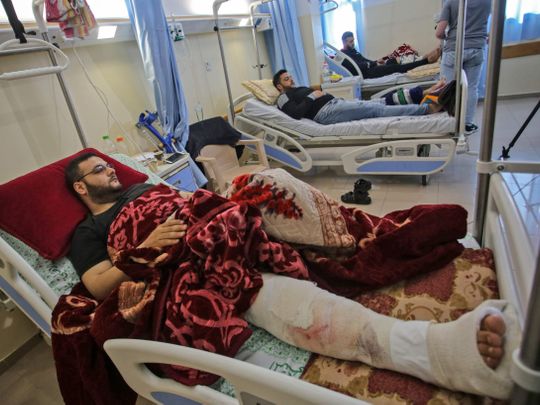
Steps taken by the Palestinian Authority in the West Bank to stop the spread of the COVID-19 disease, caused by the Coronavirus, give the impression that Palestine is able to function like any other sovereign country desperately fighting to preserve the well-being of its own people.
Sadly, however, Palestine remains the exception, as the PA operates fully under a cruel Israeli military occupation that has no regard, whatsoever, for the lives of the Palestinian people. This matters in the case of the COVID-19 as it does in every aspect of Palestinian life.
Indeed, for Palestinians, fighting an outbreak of the Coronavirus is not a straightforward matter, even if the dysfunctional PA facilities follow the instructions of the World Health Organisation (WHO) to the letter.
Gaza’s hospitals are as dysfunctional as ever, Gaza’s water is as dirty as ever and, despite repeated warnings, the Strip is still unfit for human habitation, thanks to the brutal Israeli siege and the silence of the international community
Palestinians are separated by an Israeli matrix of control that has excluded many communities behind large cement walls, military checkpoints, and impossible-to-navigate army ordinances that are inherently designed to weaken the Palestinian community and ease the Israeli government’s mission of controlling Palestinians and colonising their land.
Welfare of Palestinians
That in mind, what can the PA do to come to the aid of tens of thousands of Palestinians in so-called ‘Area C’ of the occupied West Bank? This region is entirely under the control of the Israeli army which has little interest in the welfare of the Palestinian inhabitants there.
Following several steps taken by the PA to curtail the devastating impact of the Coronavirus which first struck in the city of Bethlehem, the Israeli government and military are operating entirely independent from any Palestinian decision.
On March 8, Israeli Defense Minister, Naftali Bennett, announced that he is mulling over a decision to completely seal off the occupied territories to stop the spread of the virus. A few days later, the Israeli army reportedly allowed groups of armed illegal Jewish settlers into the Sebastia archeological site in the northern West Bank, despite the fact that the PA had already decided to close off all tourist sites to fight the deadly outbreak.
What is the use of the PA Ministry of Health’s “state of emergency” if the Israeli occupation gives itself the right to override any Palestinian decision? This question becomes even more troubling when considered within the context of what WHO refers to as “health inequalities” among Palestinians, on the one hand, and between Palestinians and privileged illegal Jewish settlers, on the other.
In some way, many Palestinian communities are already ‘quarantined’ by Israel, but for political, not medical reasons. An outbreak of the coronavirus in some of these communities, especially the ones that are cut off from proper health care and well-equipped medical facilities, would prove disastrous.
Hermetic siege
The worst of fates, however, awaits Gaza, should the deadly and fast-spreading virus find its way through the hermetic siege, which engulfs this minuscule and densely populated region. Gaza, which is enduring its 12th year of Israeli siege and is still reeling under the massive destruction of several Israeli wars, has already been declared “uninhabitable” by the United Nations.
However, the misery of Gaza never ceases to unfold. Not a single UN report on Gaza’s ailing medical facilities or preparedness for at least the last ten years has used any positive or even hopeful language.
Last March, UN Humanitarian Coordinator for the occupied Palestinian territory, Jamie McGoldrick, bemoaned Gaza’s “chronic power outages, gaps in critical services, including mental health and psychosocial support, and shortages of essential medicines and supplies.”
In January, the Israeli rights group, B’Tselem, spoke of an unprecedented health crisis in besieged Gaza, one that is not fuelled by the Coronavirus or any other such epidemics but by the fact that Gaza’s barely functioning hospitals are desperately trying to deal with the fallout of the thousands of injuries resulting from the ‘Great March of Return’ which has taken place on the Gaza side of the dividing fence.
This is only a small part of a much more multifaceted crisis. Not only measles is and other highly contagious infectious diseases finding their way back to Gaza, but waterborne diseases are also spreading at an alarming rate.
97% of all of Gaza’s water is not fit for human consumption, according to the WHO. “Even when it is available, doctors and nurses are unable to sterilise their hands because of the water quality,” according to the RAND Corporation.
All previous reports on Gaza by WHO, while accurately detailing the problem, did little to diagnose its roots or to fashion a permanent solution to it. Indeed, Gaza’s hospitals are as dysfunctional as ever, Gaza’s water is as dirty as ever and, despite repeated warnings, the Strip is still unfit for human habitation, thanks to the brutal Israeli siege and the silence of the international community.
The truth is that no amount of ‘preparedness’ in Gaza — or, frankly, anywhere in occupied Palestine — can stop the spread of the coronavirus. What is needed is a fundamental and structural change that would emancipate the Palestinian health care system from the horrific impact of the Israeli occupation and the Israeli government’s policies of perpetual siege and politically-imposed ‘quarantines’ — also known as apartheid.
— Ramzy Baroud is a journalist and the Editor of The Palestine Chronicle. He is the author of five books. His latest is “These Chains Will Be Broken: Palestinian Stories of Struggle and Defiance in Israeli Prisons” (Clarity Press, Atlanta)










